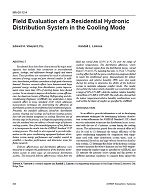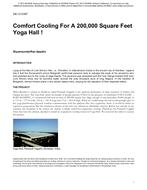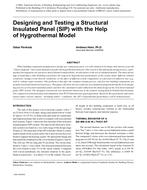In 2007/2008 the Renewables and Integrated Energy Systems Group at Natural Resources Canada (NRCan), a department of the Canadian Federal Government, initiated a new study of residential hot-water use with the aim of determining whether or not there had been any significant change since the last study conducted. The NRCan study utilized lowcost data loggers together with accurate flowmeters to monitor the volume of hot water drawn every two to four seconds, for a period of approximately two to three weeks, at each test site. This study monitored 38 households in the greater Ottawa area and, as such, is believed to be the largest such study of its kind conducted since the earlier work completed by Perlman and Mills (1985) or Werden and Spielvogel (1969a, 1969b). NRCan has now extended the hot-water use monitoring to other regions in Ontario, in collaboration with Union Gas, Ltd., and with the assistance of Caneta Research, Inc., adding another 36 households to the study. The new regions covered included Hamilton, London, and Sudbury.
As a result of our new study, we have found that people’s habits have changed and that hot-water use today is quite different to the assumptions used in the current performance test standards; for example, the total household average daily hot-water volume appears to have decreased, the average draw volume flow rates are lower, and the average number of draws per day are much greater. The authors present the results of monitoring 74 households’ hot-water use and discuss the implications of these results with respect to the water heater performance test standards and the derived energy factor.
Citation: ASHRAE Transactions, Volume 117, Part 1, Las Vegas, NV
Product Details
- Published:
- 2011
- Number of Pages:
- 10
- File Size:
- 1 file , 4.9 MB
- Product Code(s):
- D-LV-11-002


